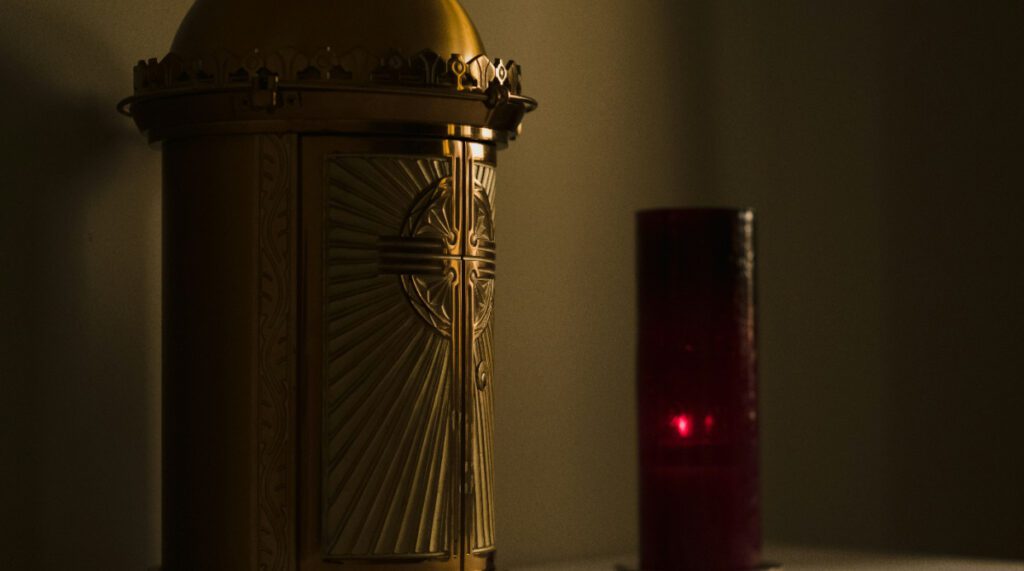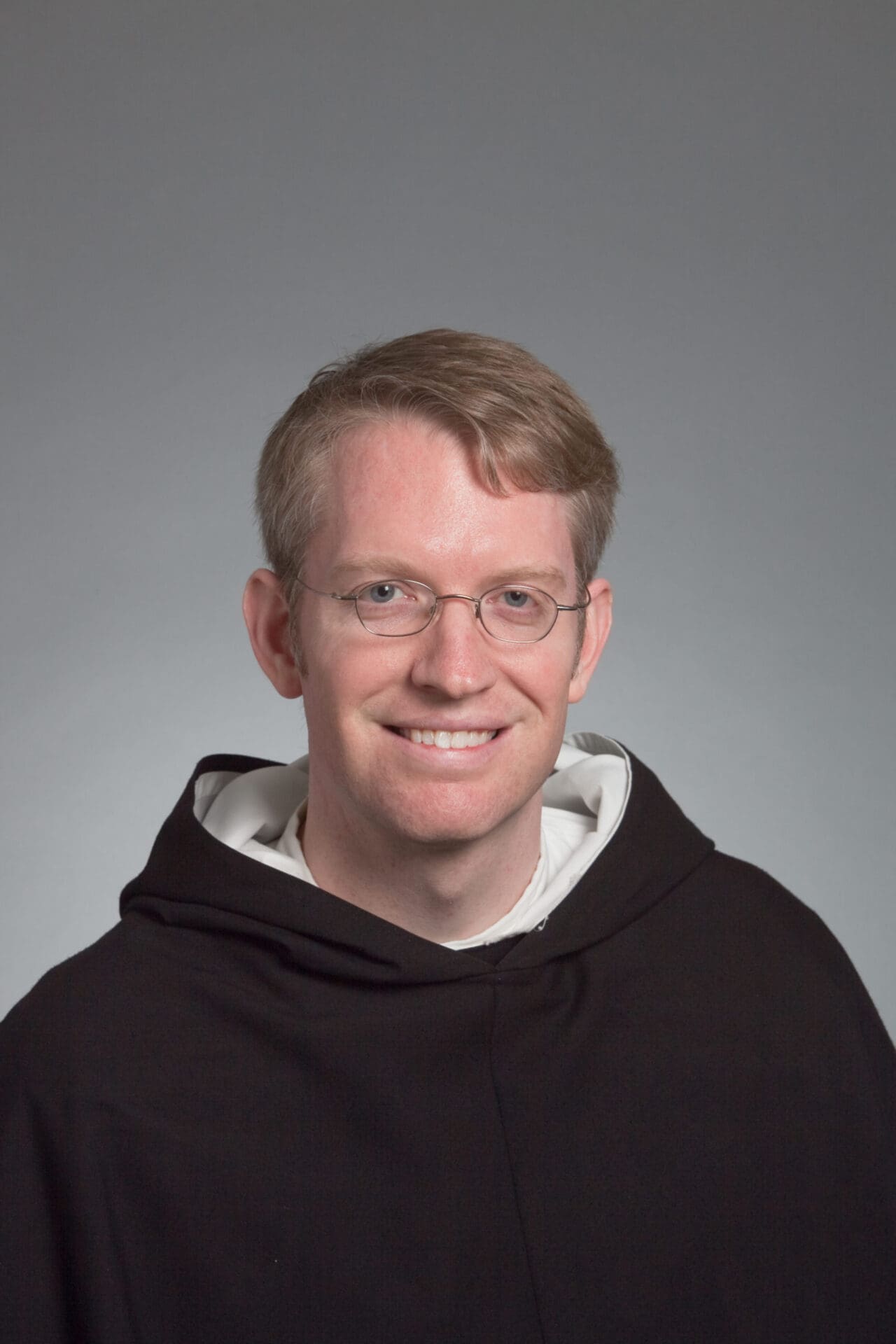Editor’s note: This is part 29 of a series, “The Kingdom of Grace.” Part 28 can be found here. It is also the text of Episode 10 of a new podcast called Contemplata: a podcast for contemplative souls. You can find Contemplata wherever you listen to podcasts.
You and I often think of ourselves as seeking God, looking for God, and we often wonder where God is or why he is hiding. The truth, however, is that God is looking for you and me. Ever since the fall of the first human beings, God called out: “Adam, where are you?” The point of the question was not to find out where Adam was in space and time. Obviously, God knew. The point was to put a certain question to the heart of Adam. The goal of God’s question was to bring Adam back to God. God does the same with you and me, too. Day and night, God stands before us to call us back to himself – so that you and I might know his Love.
There is one place above all where you and I can come to know the love of God. That place is the Eucharist. It is called the sacrament of charity – the sacrament of love. It was out of love that Jesus Christ set up this great sacrament in the Church. It was in order to remain with us always. It was in order to bring us back to himself in eternity. For God knows where you and I are. He knows that humanity has wandered far from the knowledge of his love for us. He knows that we need a sign of his love as well as a concrete way to come to know his love for us once again.
God so loved the world that he gave his only begotten Son, Jesus Christ (Jn 3:16). It is not that we loved God, but that he first loved us, and sent his Son to be expiation for our sins (1 Jn.4:10). In order to reveal to us the magnitude of his love, God sent his Son Jesus Christ into the world to die on the cross for you and for me. His voluntary choice to go to the cross is the ultimate proof of God’s love for each one of us. We believe in a God who is willing to suffer with us and even die for us. That’s how much God loves us.
Yet, it was not enough for God to send his Son into the world to die for us. He knew his Son would not be on the earth forever. He also knew that most people would never see the face of Jesus on the earth or hear his voice resound in their ears. Most people would live in a time and place far away from Jesus of Nazareth. So, God did two things.
First, he sent the twelve apostles and the preachers of the ages to announce the gospel of Jesus Christ to people everywhere. In this way, many more people would come to hear the good news of God’s love for us. Many more would come to learn of the incarnation of the word, the death and resurrection of Jesus Christ, and the grace of the Holy Spirit available to those who call upon the name of Jesus. But even that was not enough. It was not enough for God to send throughout the world a multitude of heralds of the gospel. God wanted to give us yet a better sign of his love and a still better way to come to know him than by listening to preaching or reading sacred Scripture.
So, God did a second and more important thing. The Lord Jesus established the ministerial priesthood in his Church. He endowed first the twelve apostles, and since them every man who is ordained a priest, with a special seal on their soul. Thanks to the seal that indelibly marks the soul of every priest, priests are able to make present on the altar the real presence of Christ in the Eucharist. In this way, by being truly present to us in the Eucharist, God provided for us on the earth a permanent form of his presence, a permanent sign of his love, and a concrete way for all people to come to know him. In short, he set up his Church in the world, and at the heart of his Church is the sacrament of charity – the Eucharist.
The presence of Christ will be with us in the Eucharist until the end of the world. No one on earth has the power to remove the Eucharist altogether from the face of the earth. Down through the centuries, many tyrants and totalitarian systems have tried, but they have never succeeded. The Eucharist has triumphed over them all. The Eucharist has triumphed in the sense that it simply remains. Gently, quietly, the candle still flickers in sanctuaries all over the world.
The Eucharist is a quiet presence of the Lord in our midst. Our Lord is very unassuming. He does not run any governments. He is not a corporate exec. He is not the president of any hospitals or universities or media conglomerates. He does not write headlines. He does not have a blog or a social media platform. He has no desire to be an influencer – at least not in the way you or I think of influencers. Why should he bother with any of that, when he knows rather well that in the end every one of us will answer to him (see Rom. 14:12)?
He knows perfectly well what Saint John of the Cross said: “In the eve of life we will be judged on love.” He also knows that he has provided you and me and all of us with more than sufficient means to come to know him and to prepare our hearts to stand before him in the eve of our lives – on the last day. He has given us his Son Jesus Christ. He has sent forth his Spirit of Truth into hearts everywhere. He has sent his preachers into the world. He has given us the Scriptures. And most importantly of all, he has given us his permanent presence in the Eucharist – the permanent sign and reality of his person and his eternal love in our midst.
Brothers and sisters, the call goes out to all the earth. Is it the love of God you seek? You will find it in the Eucharist. Do you hunger for a life greater than the whole world has to give you? You will find it in the Eucharist. What is the secret to the renewal of the world? You will find it in the Eucharist. Do you hunger for the bread from heaven? Do you long for the light of the world? Do you really want the resurrection and the life? You will find it all in the Eucharist. For in the Eucharist, you will find him – Jesus.
He has shown us where to find him. His only question is this: where are you?
_______________________________________________________
Image: Unsplash




